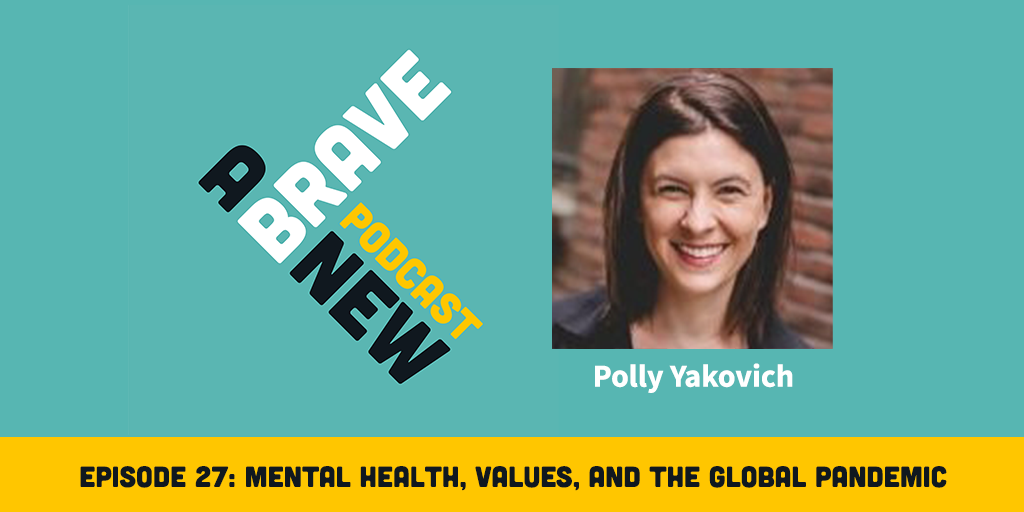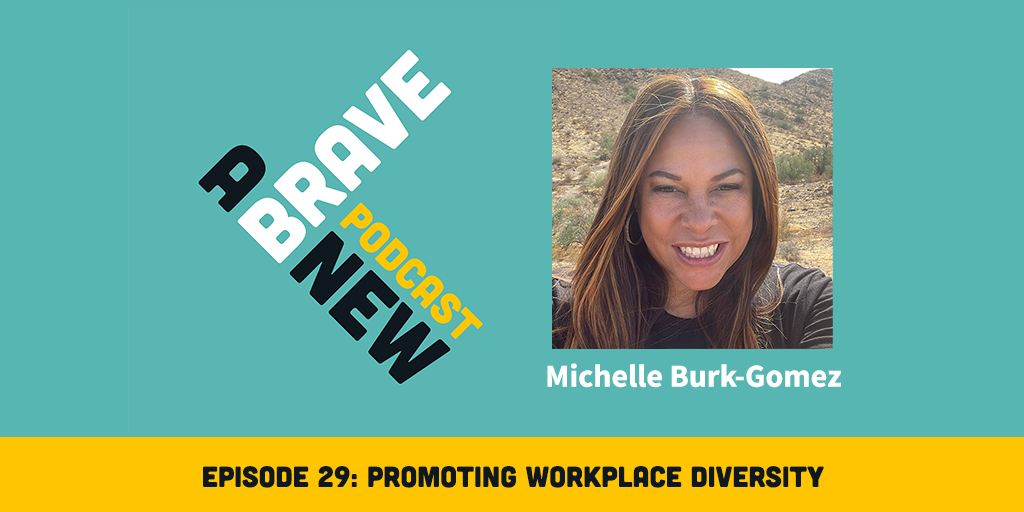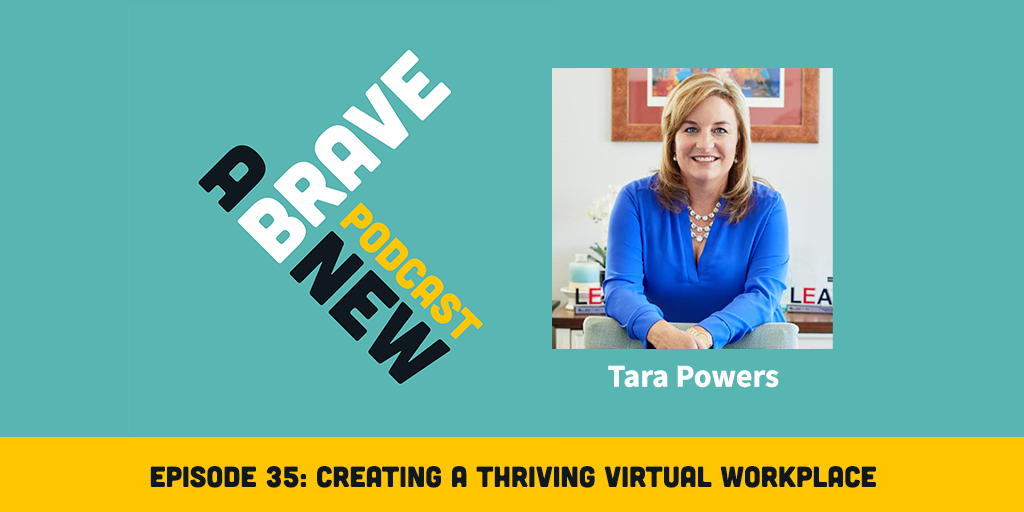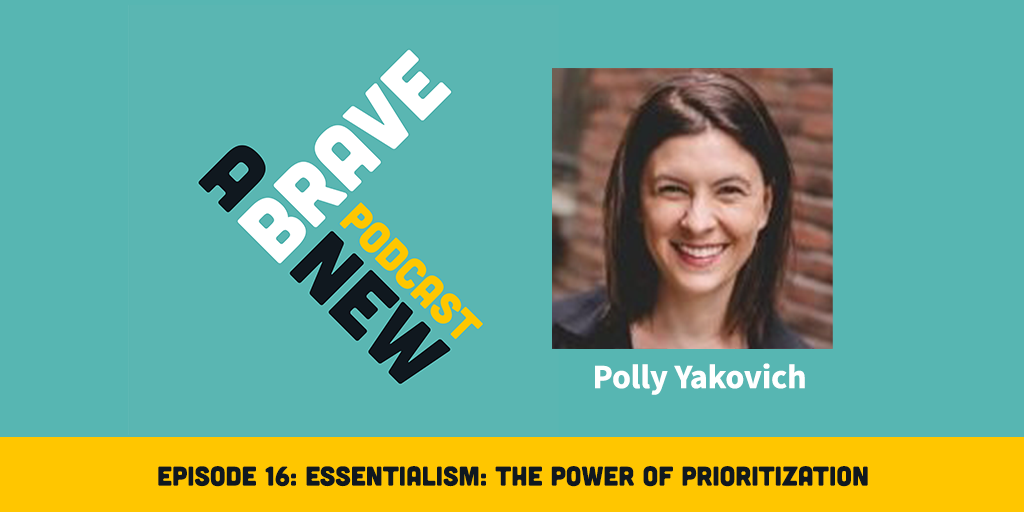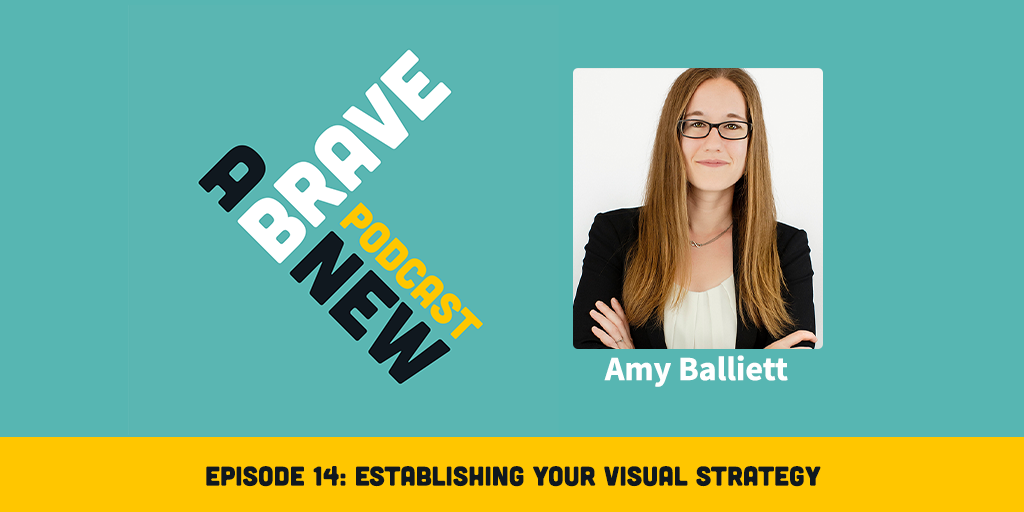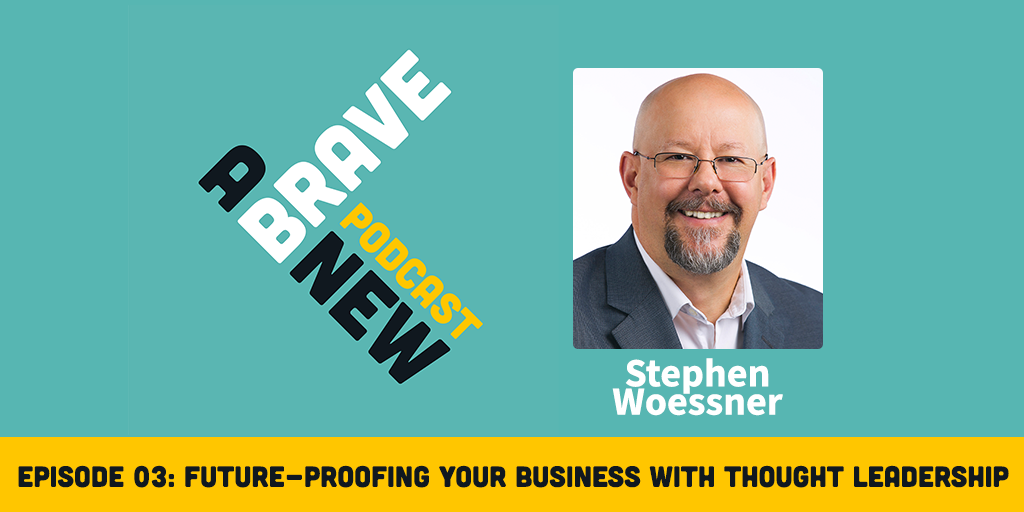Polly Yakovich is Co-founder and CMO at A Brave New, a Seattle digital marketing agency focused on helping businesses accelerate their growth through inbound marketing, branding, and web design. She specializes in working with clients to identify barriers to their growth and overcoming them with strategic content and marketing tactics. She has more than fifteen years of experience in digital marketing and branding.
What you’ll learn about in this episode:
- Why talented marketing agencies (and marketers) are easy to find, but amazing working relationships can be elusive, or break down over time
- How to choose the right partners: agencies, freelancers, and more
- Why honesty is always the best policy, even when that means getting honest with yourself
- How to give and receive feedback
- How to maintain the relationship and grow together
Additional resources:
- White Paper: How we work with clients (and why it works)
- A Brave New’s website
Show Transcription:
Intro: Welcome to A Brave New Podcast. The podcast all about how brave entrepreneurial companies are unlocking their business potential using inbound marketing. Here is your marketing expert and host Polly Yakovich.
Welcome back to A Brave New Podcast. This is Polly, your host and happy 2022. I hope you ended 2021 well. I hope you're entering 2022 with new goals, aspirations. I don't know if you make resolutions for the year. But I thought it would be nice to kick off the year with some guidelines for how to effectively partner together as a client and agency to not only do your best work, but also enjoy working together. I feel like it's a really good time for this conversation because typically you've ended the year in 2021, maybe a little frantic, maybe a little frayed, maybe not presenting your best self at all times. And it always feels good to turn over that page of a new year. And this really can apply to anyone. This is not just about the agency client relationship, which has spawned, many, many volumes throughout the years about how it can be great and how it can be contentious.
But really this can apply also to internal teams, sales and marketing comes to mind with some kind of love, hate, contentious, successful relationships. This can apply also to how you work with freelance or contractors. These are really just thoughts about how we can all work together well. So I'm going to frame these in the agency, client relationship framework, but really just apply it to whatever framework you have and not all of this will apply to everyone, but hopefully there are some nuggets in here you can take away, but really our goal, and one of the goals I have for 2022 is to think about for myself and for all of our employees, how can we bring our best, whole selves to work? How can we be our best whole selves at work? How can we bring that out in everyone? How can we create environments in which people... Work is work to an extent, but that people feel like they're doing their best at work.
That they're being valued, that they're able to be their whole selves. They're not their work self and then they have to leave that there. And then they get up, put on their real self hat afterwards. And it's really about getting the best outcomes and enjoying our work together. Because if working together is painful, it won't last long. And that's true, whether you're a client and you would fire your agency if working together is too painful, or whether you're working with freelancers that you don't want to continue with, or if working internally is too painful and you want to leave. So on a light note, at the end of 2021, I don't know if any of you follow Marketing Profs, but there are really great resource website, newsletter, et cetera. And they shared on LinkedIn, some requests that agencies were hearing from their clients or that you, as a marketing professional were hearing from your boss that made you want to add their name to the naughty list.
And I want to just read a couple of these because they're pretty true. And agencies like to circulate and laugh at these kind of things, but they happen all the time. And one of them was a client that said, "I don't know what I want. I'll know it when I see it. So keep trying." Helpful. Another one was no feedback, except it's just not doing it for me, also helpful. And then someone else said, can you just Photoshop that out of the video? Which probably has every art director and graphic designer rolling their eyes deep, deep back into their skull. Another one that I liked was we want to be the first results on Google. Can you do that real quick? Which is really a favorite for those of us who do content or inbound programs or SEO, and have been working for years to get to the first results on Google with maybe some movement, but maybe not full success.
So I want to share a few things today about working well together and again, agency, client specific but applicable to others. And in fact, I co-wrote a resource on this with one of our clients who is the VP of marketing at Vera Whole Heath. Her name is Susan Curhan and she is brilliant and a wonderful client and a client with whom we have a real relationship that includes some good days and bad days and grappling together and succeeding together as well. And she and I wrote a resource. I'm going to link to it in the show notes about how we work with clients and some wisdom from both sides as you will of the fence. So working well together is an enduring topic because I think, and I hope that everyone means well, but also at the end of the day, we're all human. So sometimes things break down.
So here are four principles or categories that I think are nice reminders for us as we start the new year. And the first of these is kind of under the banner of choosing the right partner to work with or choosing the right agency. And this may be something that you're not doing right now, but I still think these principles are really important for you to do a little bit of audit of the partners that you're working with, whether it's one agency or multiple or contractors, et cetera. And the first thing that I think is important about choosing the right agency is finding an agency that's the right size for you, or perhaps has the right size team that's the team that you want to work with. Because if your organization is pretty small and you choose a huge agency, you will not be seen as the most important client.
And in fact, you probably will have really junior people working on your work. And so just to keep things in context, you want to find an agency that's going to treat you as a high priority, or you can rightsize your expectations and say we know we want the big agency for these reasons, and we know we're going to work with the junior team, but X, Y, Z is a reason why we think that's okay or important or going to work well for us. Another one, and this is good for starting a new year, whether you're with a new agency or looking for a new agency is really being clear about your primary goals. So there's lots of talented agencies out there, but if you go for a hotshot design agency and need a lot of foundational SEO work, and you want to hit the first results on Google and you really need to get your inbound marketing program running, and you just have a lot of foundational things you need to do, or a lot of optimization, the hotshot design agency isn't going to be the right fit.
So being really, and this is tough, but being really honest with yourself about what you're trying to achieve. And then also being able to clearly communicate that with your agency, because there's nothing worse than hiring an agency for reasons that don't fit what you're actually trying to achieve, and then them just failing all the time. That's not helpful for anyone and no one wants to be in that situation. So be honest about what you need and ask your agency to share their relevant experience, case studies, et cetera. The other thing is being really clear about budget. And I think that this is good, whether you're going into a new year or talking to a new agency, but it's just really important to know how much money you actually have to spend, because if you are coy about your budget, but you have a thousand things on your agenda, and then you get into a relationship where that money's not going to go far enough, then nobody is going to be successful there.
And I think that agencies often feel that clients like to point the finger at them. And that may be true in some situations, but for a successful relationship, you have to be very clear about the money you have to spend and what you need to get out of that. And from my perspective, that often includes conversations like, "Yeah, I know you want to do items one through 10, but to do them well and to catapult off of success, you probably should constrain a small budget to items one through three and do them perfectly, rather than spreading your money across items one through 10 and doing them a little bit. And maybe, but maybe not reaching your goals." The other thing that I think is important and something we can get back to, hopefully this year is meeting the people you'll be working with.
And I know that Zoom does get us some ways here, and I'm going to talk about this again, when I talk about maintaining the relationship, but there is something to being in person with people. And I think sometimes people are making big decisions relatively quickly and Zoom can get you some of what you need, but it's also just really nice to meet the people you'll be working with. If you're in the same city and you're comfortable, maybe it's time to meet up again. Maybe it's time to do a pitch in person, particularly when we start talking about long term relationships, I think it's important to be together if everyone's comfortable with it and it's safe to do so. Because the best working relationships on any level are where you enjoy the people that you're working with and there's mutual respect, and you value each person for their contributions.
And in the best case scenario, hopefully you're going to do that with your agency or with your client or with your freelancer or with internal teams. And then the last piece under this point is just being honest. In the best case scenario, if you're going to embark on a relationship with a new agency. And I think that there's time to revisit this if you're with your current agency on a regular basis, they're going to going to ask about your past experiences, working with other people. What worked and what didn't, why are you looking for a new agency? Being really clear and honest about your work style or what it's going to be like to work with your company is again, going to set everyone up for success. If it is difficult to work with you, and you're going to route every single thing that comes across to 35 people, but really nothing can ever get published without the VP sign off, you really need to say that upfront.
Because you're setting the stage for failures in time, failures in process, failure in budget when your agency goes over budget, because you told them it was really easy to get work approved. It doesn't mean that you have to be afraid of things that you may perceive are challenging about your company or your organization's work style. But the more honest you can be about it, you'll find the right partner because the agency will say, "Oh yeah, we're accustomed to a really lengthy review and we'll work that into our budget and we'll build our schedules accordingly and then everyone will be successful together." And that's going to feel a lot different than... There's nothing worse than, and I've been in this situation many times, people saying like, "Oh we're so easy to work with."
And then you get into a relationship with them and they're not easy to work with and it's not bad. It's just, it could have been prevented upfront if people were honest about what was required. And so I really encourage you to be honest about the good, the bad and the ugly with your agency. And then also if you're with a current agency or a current partner or working with freelancers, having sort of a check in now and then, and saying like, "Okay, hey, we're always running late on this because so, and so can't complete their review. How can we get ahead of this? Do we build more time to this schedule? Can we look ahead of this schedule and put review time on their calendar? What can we do to be proactive because we're frustrating everyone and that's not a good environment to work in it and we really can solve this."
So all of that under the category of choosing the right agency or auditing some of these pieces with your current partner. Then once you're getting to work, you really have to start doing a lot of things that are building blocks to your long term relationship. And I really encourage you, if you're hiring an agency or a partner, nothing's going to be worse than making that partner feel like they're on the ropes all the time. And that it's a constant tryout. It doesn't lead to a successful work environment. And I think these days of being so tough and putting the agency constantly on their heels and berating them all the time, which is something I still hear about, they're just over. Because agencies are going to decline your work. And there's just really no reason to be like that as a professional in 2022, I just don't see the reason to be like that, to be honest.
And so I really encourage you to think of your relationship as a long term partnership. And it's like, how can we all work together as colleagues? How can we extend trust? One of the things we talk about here at Brave New, one of our core values is positive regard. And we talk a lot about this with our employees, particularly when it's like, "Ugh, this client so-and-so is always holding me up because they don't review it till 5:00 PM. Or this client so-and-so is always messing up my schedule because they X, Y, Z." And one of the things we really coach on is if you look at of regard and again, you can look this up and I'm going to semi botch it. But for our purposes, it's spending time to think of that person and put yourself in their shoes and say, what's their context.
And are they doing the best they can with the tools that they have in that moment. And assuming that they are doing the best they can with the tools they have in that moment. And additionally, really relying on empathy to say, "Oh gosh, they're in meetings all day. And then they have to start doing their work at 4:00 PM and rip through their to-do list so that they can get out of there by whatever, because they work long hours and they have such a meeting culture." Right? And so if you look at that person with empathy, you can say like, "Oh my gosh, poor thing. They're just starting to get through their list at 5:00 PM every day. And that must make them feel so stressed, right?" So then we can work with them to try and work around that, or at least realize that it's not about them trying to make our lives hard.
I think that this goes a long way on both sides of the fence. Other things that I think are really necessary foundationally is giving your agency some free reign. Give them a problem to solve. Don't give them endless data and then let them do what they're best at, what they're good at. I think giving structured and expert feedback is great, but rely on the process and give your input at the right times in the process, because any agency is going to want your input and they're going to want it at the right times. And you should work with your team to constrain giving endless feedback and data and give it at the right times so that the agency can be effective. One of the things that I see a lot with clients, and this happens naturally, and we understand it because everyone's human, but it's hard to constrain yourself to the times where input's needed.
Polly Yakovich:
And so they just drip things in all the time. And then they're frustrated that the agency's frustrated that they're off track or off schedule because they're paying the agency. But the agency can only be profitable at the price they've given you if you stick to the process and the schedule, and there's all always going to be some exceptions, but hopefully the agency has more than one client. Otherwise there's other problems there. And the best way for them to keep everyone on track is to keep them to the schedule and to have people keeping their end of the bargain and doing what they say they're going to do. So I think it's really important for you to be involved in the planning process. I think it's really important for you to make subject matter experts available at the right times. I think that it's important for agency and clients to collaborate on creative strategy.
What are we selling? Who do we want to sell to? What do we want them to think, feel and do? What do we want the creative to do for our brand? How are we communicating our brand through anything that's creative. And then I think that you should always insist on and have, and collaborate on and give good input to the creative brief or the strategy brief, or the project brief or whatever that is. If you're someone who thinks you don't need a brief, but then is going to be disappointed in the end product because you haven't documented it along the way, that's where that brief becomes really important. And the agency can't really be successful amongst big team without a common point of truth. And so that's a really important building block that I think is important for your working relationship. If you don't work with an agency and you have an internal team, it's still important to document your process and have all of these steps because you need to again, be efficient.
You need to constrain people so that your product at the end is laser focused and does the exact right thing that it's supposed to do. You're not creating marketing content that sort of does everything for everyone. That's not very effective. And so I really encourage you, and whenever I work with internal teams that do everything internally, we really encourage them to set up a strong process. Clients that work with agencies can kind of get away with not having it because the agency certainly has a process. And then it's really important, this trust piece is really, really important. And some of this happens over time, but I just really encourage you if you're starting out with an agency to assume trust at the beginning and yes, they'll earn it or lose it, but you hired them for a reason. And so trust them to do their jobs. It'll go really a long way.
And treat them like they're an extension of your team, give them the same expectations, but also some of the same human kindnesses that you would extend to your colleagues that sometimes to don't get extended across to agency or freelance or contract partners, right? They're not machines. None of us are machines. And I think if anything in the last couple years has taught us that it's like don't send your contract or something at 5:00 PM and expect it back at 8 AM. That's unkind. That means they're working all night while their kid isn't front of the TV or whatever it may be. You know? And so there are times and places that happens, but try and build up that well of positivity so if that happens once in a great moon, you can say, "I am so sorry I have to ask this of you. Can I send you and your family dinner so that you could get this done tonight?" Whatever that may be.
The third point I want to make about working together is the review process. I made some jokes at the beginning of this podcast about no feedback, except it's just not doing it for me or I don't know what I want to I'll like it when I see the right thing, but feedback and giving feedback in professional way is an incredibly important part of the agency, client collaboration, internal collaboration, working with freelancers and contractors besides being really specific and setting the stage up front, providing feedback is really important. Hopefully you have a presentation. I really do like to for creative work, have a presentation because it's helpful to chat together about it. One thing I really want to encourage you is don't be so hard on your creative that you can't say I like it, or that looks great.
Or I like what you did here. A few compliments again, everyone's human, a few compliments go a long way. Particularly when you're going to be asking for changes or edits. We're professionals. We've been getting feedback our whole lives, but lots of times the feedback comes across. And I just cringe a little bit because it's just so inhuman and our people are working so hard. And again, positive regard, I don't think people mean to sound this way, but it's like take that little extra second and say, I can really appreciate the thought process you put in here, right? At the very most strategic, it sets them up to receive your feedback better, if you can start it off with a compliment. Again, in that vein focus on what's working and how to make it better. So focus on the concept you like sometimes if there's a couple different concepts and you really dislike one, don't spend the whole meeting talking about the one you dislike rather than when you want to like, and want to build on.
I feel like it's really challenging because sometimes it's like, okay, we have a 30 minute meeting. We spent 20 minutes talking about what we didn't like, which is purposeless. Because we weren't going to continue with it anyway. Like just know when not to beat that dead horse. I think we're not going to move forward with concept three. I think whatever one and two have more possibility. So let's talk about those focus on the direction and not specific changes. Feedback is often about static opinions, but direction is better for action and decision making. So this is a very, very, very important point that I think often gets missed. But it is so unimportant what you think about it, right? I hear feedback all the time that's about, well, my mom wouldn't like that or I don't like that or et cetera, et cetera.
And it's like, make sure that your audience and your persona is absolutely crystal clear in your mind and you know what they would like, so you're speaking on their behalf. It's not about what you would like best. It's not about whether your mom likes receiving phone calls. It's about how your audience actually responds to things and what they're looking for. And then you don't have to give specific art direction when you are reviewing. Talk about I'd like it to feel more like this. The audience is looking to feel this way. They'd like to understand this better. Be really specific about the direction. Not like, oh, Hey, try putting a Starburst in the left corner. And then maybe if you extended the font... I think it's more about direction, particularly. It depends on how big the creative project is, but particularly in the beginning.
And then when it comes to giving feedback, I think if you are on the client or organization side, make sure that you have a training process for giving feedback. Most agency people are very experienced at receiving feedback. They receive a lot of feedback, again, in a kind and unkind way, but letting untrained junior team members like loose on giving feedback about what they like or brands they like or logos they like or things like that is not as helpful as you may think. So I would say train your people to say what they like and where the gaps are versus the brief, what we're trying to do for the audience. Give them maybe the opportunity to share first. And then you can clean up afterwards with the direction for the agency. When creatives are close I think you steer the creative a bit closer when it comes back and it's far away, you need to step back and rephrase the problem to be solved and then love the work.
Be passionate. Challenge the work to be better, takes some chances when you can. Reward effort and then you can celebrate the success together. A great agency is agile and absolutely dedicated to continuous improvement. So at the same time that I might sound a little bit defensive as an agency person because I really have heard and seen some tough stuff, and I continue to. You don't want an agency. That's going to be defensive about the work, right?
If you are making sure that you're doing the right thing, you're protecting your brand, you're protecting your customer. You have a great process in place, you should be able to give feedback and it be received in a fair manner. So if your agency is overly defensive or talks down to you or says, oh, you don't know about this or that, or that's the feeling that you get, then that's maybe not the right partner for them. Because agencies should be looking to learn and pivot and improve their approach at every it's also our job to take all that feedback. And so we should do it in a way that's proactive and it makes everyone feel like they're moving the project forward.
And then last is maintaining the relationship. I would say, great work comes from a great partnership. And those partnerships take a little TLC because we're working together all the time, but things can slip over time. And sometimes the agency can be the fall person for bad internal relationships. I think between sales and marketing, that can often be a point of contention and people can be pointing their finger at the agency when really internal conflicts need to be worked out. But you really can stay connected to your agency in a human way and keep them motivated so that they're excited to work on your work. This is the other thing that I think sometimes clients forget about is if they become so difficult and hard to work with, long before the agency declined your account, people internally just start rolling their eyes and groaning and not wanting to do work for you because it just means that they're going to always turn the corner into your negativity or your bad feedback, or you're chastising them about this or that.
So they're going to sort of want to postpone those feelings. And I just really can't emphasize enough that you should make the agency or contractors or freelancers an extension of your team and think about how you would motivate your team. You want agencies to love working for you. You want them to want to work on your stuff first. You want them to bring their best ideas to you, right? They're not going to do that if they get shot down a lot. And so think about ways that you can really be the hero client that everyone wants to work on. Don't settle for work you don't like. Be honest with your agency. Sometimes you're going to have to ship something that didn't seem quite right and then make sure you have a lessons learned. Ask for that. Talk about how you can do the work better. I think it's really important to just communicate and it's okay to tell your agency, I'm really struggling with these things internally.
How would you approach that? Can we think about things together? Make your agency, your strategic partner. Don't just make them your execution monkeys. They want to help you think about things and think about challenges and how to reach new people and make sure you're having ideation with your agency so that you can be together and think about how to think about things and how to think about things outside the box. Even if they may be ideas that you wouldn't be able to fully execute. Make sure to spend some time brainstorming, don't make it so production oriented that you lose sort of that connection and that creativity. And then again, I just want to bookend by saying, I think some of our relationships are a little bit strained because we'd just haven't been able to be together and people want to work with people they enjoy working with.
And that's true of the client agency relationship too, going both ways. And so, if you're in the same town, see if you can grab drinks, if it feels safe to you, it's important. I think, and we've kind of removed it from our budget, but if you're out of town, try and see if your agency will come visit you once that year, a couple times that year, whatever your cadence is, it used to be, we would travel to certain clients monthly or quarterly. But I think some of that connection time is lost and not replicable over Zoom. So if you could do some ideation and brainstorming, think about new products together in person, go out to dinner. I think that those connections will help to make the work a lot better and to make working together more fun, which I think is a big part of the equation.
So those are just a few thoughts. Again, it's complicated working with other humans is always complicated and I just lean back on this idea of positive regard and empathy, that everyone wants to be successful at work and that we can be more successful when we're building up those around us. And when we are kind and make other people succeed, then they want to work with us more and they want to partner with us more. And so just keep that in mind, as you're thinking about how you work with your partners internally and externally. And I'm super excited that it's a new year and that we can all turn over leaves and that we can say, okay, I've kind of gotten into some bad habits last year with how I interact with colleagues or my agency or these partners. And I really want to start fresh and maybe even have a conversation to that regard.
What feedback can you give me about how we worked together last year? What things would you like to see differently? Next? I like the framework a lot that I borrowed from Chris Irig, who is an amazing culture coach. And I have a podcast with him that we can link to as well. But he has a framework, keep, Stop, start, which I'm sure he didn't make up, but it's something that I use personally and professionally a lot.
What things do I want to keep doing? Or do you want me to keep doing? What things should I stop doing that are annoying or ineffective or unhelpful? And what things should I start doing or that you think would be positive to begin? So hopefully that's helpful to you. I'll link to some of the resources in the show notes. Again, there's this PDF that you can download about how we work with clients that Susan and I co-wrote to together. And hopefully there was a nugget in there for you to take away. I'm really excited to see all of our goals and all of our plans unfold for this new year. Happy new year, catch you next time.
Outro: Thanks for listening to this episode of A Brave New Podcast. Go to abravenew.com for more resources and advice. If you enjoyed this episode, show us some love by subscribing, rating and reviewing A Brave New Podcast wherever you listen to your podcasts.
Similar Articles
OCT 11, 2021

The Beginner’s Guide to Generating Inbound Leads
Marketing doesn’t have to be painfully intrusive, like getting yet another telemarketing call right when you sit down to dinner with your family.
OCT 11, 2021

The Beginner’s Guide to Generating Inbound Leads
Marketing doesn’t have to be painfully intrusive, like getting yet another telemarketing call right when you sit down to dinner with your family.

